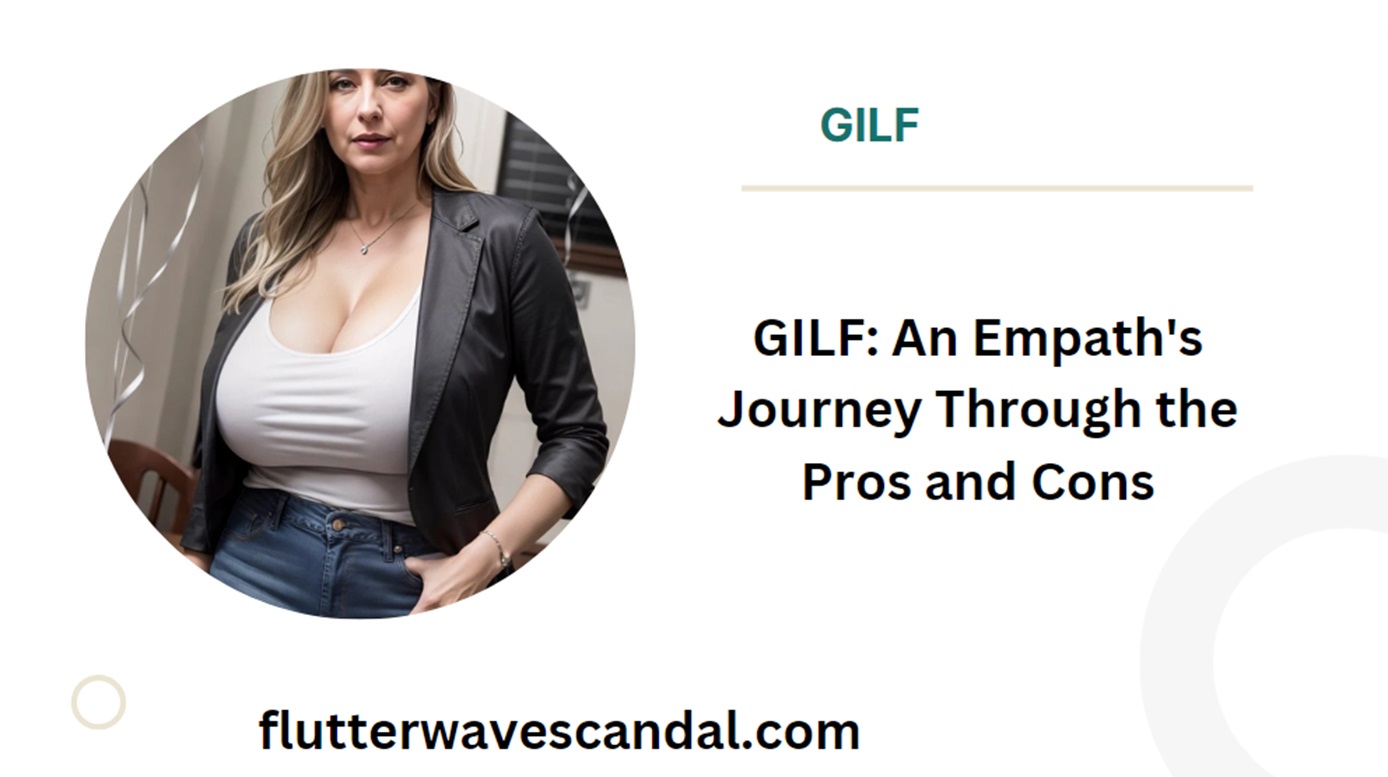
gilf
In recent years, the term “GILF” has become increasingly popular in modern vernacular. An acronym standing for “Grandparent I’d Like to F***,” the term GILF often carries a mixture of admiration and objectification. For individuals who are empaths, being called a GILF can elicit a unique set of reactions and emotions. Empaths, known for their heightened sensitivity to the feelings and energies of others, may navigate this label differently compared to others. This article delves into the pros and cons of being called a GILF from an empath’s perspective, examining how this label intersects with their intrinsic qualities.
Table of Contents
Understanding Empaths and Their Sensitivities
Before delving into the specific pros and cons, it is essential to understand who empaths are. Empaths are individuals who possess a remarkable ability to deeply feel and understand the emotions of those around them. This heightened sensitivity often extends beyond mere empathy, allowing them to experience the feelings of others almost as if they were their own. This can be both a gift and a burden, as empaths often find themselves overwhelmed by the emotional energies they absorb.
The Pros of Being Called a GILF
1. Boost in Self-Esteem and Confidence
One of the positive aspects of being called a GILF is the potential boost in self-esteem and confidence. For empaths, who are often acutely aware of their own and others’ insecurities, being recognized as attractive and desirable can be affirming. It can serve as a reminder that age does not diminish one’s appeal and that they still possess qualities that are admired and sought after.
Empaths might feel a sense of validation when they are complimented in this manner, as it reinforces the idea that they are still vibrant and attractive despite societal stereotypes about aging. This recognition can help counteract the negative self-talk that empaths may be prone to, fostering a more positive self-image.
2. Enhanced Social Connections
Being called a GILF can open doors to new social interactions and connections. Empaths often thrive on deep, meaningful relationships, and this label can serve as an icebreaker or conversation starter. It can provide opportunities for empaths to engage with others who appreciate their unique qualities, leading to the formation of new friendships or even romantic relationships.
For empaths, these connections can be incredibly enriching, as they value genuine emotional bonds. The attention garnered from being called a GILF might lead them to meet individuals who share similar interests and values, ultimately enhancing their social circle and emotional support network.
3. Encouragement to Embrace Aging
Another significant advantage of being called a GILF is the encouragement it provides to embrace aging gracefully. Empaths, who are often deeply attuned to the passage of time and its effects, can sometimes struggle with the concept of getting older. However, being recognized as a GILF can shift their perspective, helping them see aging as a journey rather than a decline.
This shift in mindset can inspire empaths to take better care of themselves, both physically and emotionally. They may feel motivated to maintain a healthy lifestyle, pursue hobbies, and continue growing as individuals. Embracing the positive aspects of aging can lead to a more fulfilling and contented life.
4. Positive Influence on Others
Empaths are natural caregivers and nurturers, often seeking to uplift and support those around them. By being called a GILF, they can serve as a positive influence on others, demonstrating that attractiveness and desirability are not confined to youth. This can challenge societal norms and encourage a more inclusive view of beauty and attractiveness.
As role models, empaths can inspire others to embrace their own aging process with confidence and pride. They can help break down age-related stereotypes and promote a more accepting and appreciative attitude towards individuals of all ages. This positive influence can extend beyond their immediate social circles, contributing to a broader cultural shift.
The Cons of Being Called a GILF
1. Objectification and Loss of Individuality
Despite the potential positives, being called a GILF also has its drawbacks. One of the primary concerns for empaths is the risk of objectification. This label can reduce an individual to their physical appearance, disregarding their personality, achievements, and unique qualities. Empaths, who value deep connections and understanding, may find this superficial focus disheartening.
The emphasis on physical attractiveness can overshadow the empath’s inner qualities and contributions, leading to a sense of being undervalued for who they truly are. This objectification can be particularly distressing for empaths, who seek meaningful interactions and connections based on mutual respect and understanding.
2. Emotional Overload
Empaths are already prone to emotional overload due to their heightened sensitivity. Being called a GILF can amplify this experience, as they may absorb not only their own feelings about the label but also the emotions of others who react to it. This can create a complex emotional landscape that is challenging to navigate.
Empaths might struggle with conflicting emotions, such as pride and discomfort, excitement and anxiety. The constant influx of external emotions can lead to burnout and emotional exhaustion, making it difficult for them to maintain their emotional equilibrium. This overload can impact their mental health and overall well-being.
3. Pressure to Maintain Appearance
Another significant downside is the pressure to maintain a certain appearance. Being called a GILF can create expectations around physical attractiveness that may feel burdensome to empaths. They might feel compelled to adhere to societal standards of beauty, even if it conflicts with their authentic selves.
This pressure can lead to unhealthy behaviors, such as excessive dieting, cosmetic procedures, or a focus on outward appearance at the expense of inner well-being. For empaths, who prioritize authenticity and emotional depth, this can be particularly distressing. The need to conform to external expectations can detract from their sense of self and inner peace.
4. Navigating Mixed Reactions
Being called a GILF can elicit mixed reactions from others, ranging from admiration to envy or even disdain. Empaths, who are acutely attuned to the emotions of those around them, may find it challenging to navigate these varying responses. They might internalize negative reactions, leading to feelings of guilt or discomfort.
Empaths may also struggle with the dichotomy of being praised for their appearance while simultaneously feeling judged or misunderstood. This internal conflict can be emotionally taxing, as they strive to balance their own feelings with the reactions of others. The constant need to navigate these mixed emotions can impact their overall sense of well-being.
Balancing the Pros and Cons
For empaths, finding a balance between the pros and cons of being called a GILF is essential. This requires a conscious effort to embrace the positives while mitigating the negatives. Here are some strategies that empaths can use to navigate this complex experience:
1. Emphasizing Inner Qualities
While being called a GILF highlights physical attractiveness, empaths can focus on emphasizing their inner qualities. By nurturing their unique strengths, such as kindness, empathy, and wisdom, they can cultivate a sense of self-worth that goes beyond external appearances. This can help counteract the objectification and maintain a balanced self-image.
2. Setting Boundaries
To manage emotional overload, empaths can set boundaries to protect their emotional well-being. This might involve limiting interactions with individuals who perpetuate superficial judgments or seeking support from trusted friends and family members. Setting boundaries allows empaths to prioritize their own needs and maintain their emotional equilibrium.
3. Practicing Self-Care
Self-care is crucial for empaths to maintain their physical and emotional health. Engaging in activities that promote relaxation and well-being, such as meditation, exercise, and creative pursuits, can help alleviate stress and prevent burnout. Empaths can also benefit from regular self-reflection and mindfulness practices to stay grounded.
4. Cultivating Authentic Relationships
Empaths thrive on authentic connections, and cultivating relationships based on mutual respect and understanding can counteract the negative aspects of being called a GILF. Surrounding themselves with individuals who appreciate them for their inner qualities can provide emotional support and reinforce their sense of self-worth.
Conclusion
Being called a GILF presents a unique set of pros and cons for empaths, who navigate this label with their heightened sensitivity and emotional awareness. While it can boost self-esteem, enhance social connections, and encourage a positive outlook on aging, it also carries the risk of objectification, emotional overload, and pressure to maintain appearances. For empaths, finding a balance between these opposing forces is essential to maintain their well-being.
By emphasizing inner qualities, setting boundaries, practicing self-care, and cultivating authentic relationships, empaths can navigate the complexities of being called a GILF with grace and resilience. Ultimately, this experience can serve as an opportunity for growth and self-discovery, allowing empaths to embrace their unique qualities and age with confidence and pride.




